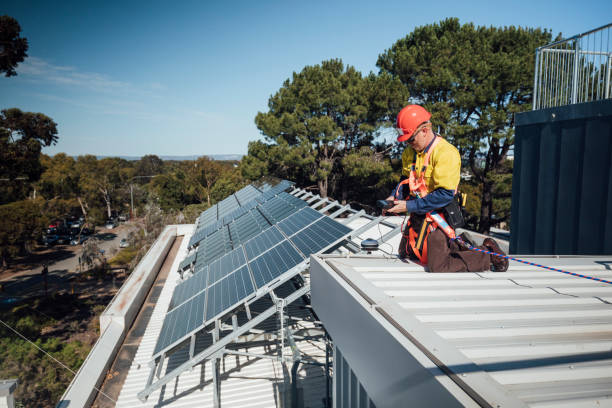Solar panel maintenance is essential for ensuring that your solar system operates efficiently and provides maximum energy output. Regular maintenance helps keep your panels clean, functional, and long-lasting, ultimately helping you save on energy costs. This guide covers everything you need to know about solar panel maintenance in Pleasant Grove UT, from routine cleaning to inspections, to help you get the most out of your solar investment.
Understanding the Importance of Solar Panel Maintenance
Solar panels are exposed to various environmental factors like dust, dirt, bird droppings, and weather elements, which can impact their efficiency. Proper maintenance can ensure that your panels generate electricity at optimal levels, allowing you to maximize your savings and reduce your carbon footprint. Regular care also prevents damage, helping you avoid costly repairs or replacements.
Key Factors Affecting Solar Panel Efficiency
Several factors can impact the efficiency of your solar panels, including:
- Dirt and Dust Accumulation: Dust and debris on the panel surface block sunlight, reducing energy production.
- Weather Conditions: Extreme heat, hail, or heavy snow can lead to panel damage.
- Shading from Nearby Trees or Buildings: Obstructions can block sunlight from reaching the panels.
- Panel Angle and Orientation: Adjusting the angle may improve sunlight absorption and overall efficiency.
Understanding these factors will help you develop a suitable maintenance plan for your solar panels.
How Often Should Solar Panels Be Maintained?
The frequency of solar panel maintenance depends on your location and environmental factors. In areas prone to dust storms, pollution, or heavy rainfall, panels may require more frequent cleaning and inspection. Generally, it’s recommended to clean solar panels at least twice a year and schedule a professional inspection annually to ensure they are operating at peak efficiency.
Basic Solar Panel Cleaning Techniques
When cleaning your solar panels, follow these basic techniques:
- Use Soft Brushes or Sponges: To avoid scratching the panels, use soft, non-abrasive brushes or sponges.
- Avoid Using Hard Water: If possible, use distilled water to prevent mineral deposits on the panel surface.
- Clean During Cooler Hours: Early mornings or evenings are ideal for cleaning to avoid water evaporating quickly and leaving residue.
- Use Mild Soap: Avoid harsh chemicals; a mild, eco-friendly soap diluted in water is effective for most cleanups.
Preventive Maintenance Tips
Preventive maintenance is essential to extend the life of your solar panels. Here are some tips:
- Regular Visual Inspections: Look for any signs of dirt buildup, shading issues, or physical damage.
- Check Wiring and Connections: Ensure there are no loose or frayed wires that could impact system performance.
- Monitor Output Levels: Regularly track your solar system’s energy output. Any unexpected drop in performance could signal a problem needing attention.
- Trim Surrounding Trees: Prevent shade from blocking sunlight by trimming trees near your solar panels.
Seasonal Maintenance Tips for Solar Panels
Different seasons bring different challenges for solar panel maintenance:
- Spring and Summer: Regularly clean dust and pollen from the panels. Ensure there are no obstructions like growing branches.
- Fall: Remove any fallen leaves that may accumulate on or around the panels, and check for any damage after summer storms.
- Winter: In snowy regions, gently remove snow buildup and ensure there’s no ice that could damage the panels or wiring.
By adapting maintenance routines to each season, you can ensure that your solar panels work efficiently all year round.
Professional Solar Panel Inspection Services
While basic cleaning can be done yourself, it’s wise to schedule a professional inspection annually. Certified technicians can perform detailed checks, including:
- Panel Condition: Inspecting for cracks, scratches, or other physical damages.
- Wiring and Electrical Components: Ensuring that all connections are secure and components are functioning properly.
- Inverter Efficiency: Testing the inverter to ensure it’s effectively converting solar energy into usable electricity.
- Performance Assessment: Technicians can measure the overall efficiency of your system and recommend adjustments if needed.
Common Solar Panel Issues and How to Address Them
Some common issues affecting solar panel performance include:
- Hot Spots: Small areas of the panel may overheat due to shading or dirt, potentially causing damage. Ensure regular cleaning and removal of obstructions.
- Corrosion: Exposure to weather elements may lead to corrosion on metal parts, reducing efficiency. Check for signs of rust or corrosion during inspections.
- Panel Cracking: Hail or falling debris can cause cracks. If you notice physical damage, contact a professional for repairs.
- Inverter Issues: A malfunctioning inverter can disrupt power generation. If your system output drops unexpectedly, have your inverter inspected.
Timely identification and correction of these issues will keep your solar system running smoothly.
FAQs
Q1: Do solar panels require a lot of maintenance?
No, solar panels require minimal maintenance, mainly involving occasional cleaning and annual inspections to ensure optimal efficiency.
Q2: Can I clean my solar panels myself?
Yes, you can clean solar panels yourself using soft brushes and mild soap. Avoid using harsh chemicals or pressure washers, which could damage the panels.
Q3: How much does professional solar panel maintenance cost?
Professional maintenance costs vary depending on location and services provided, generally ranging from $150 to $350 for annual inspections and cleaning.
Q4: How can I tell if my solar panels need maintenance?
A noticeable drop in energy output or visible signs of dirt, debris, or damage on the panels may indicate the need for maintenance.
Q5: Are solar panels durable in extreme weather?
Most solar panels are designed to withstand various weather conditions, but extreme heat, hail, or snow can sometimes cause damage. Regular inspections help ensure durability.
Conclusion
Maintaining your best solar panels is a simple yet crucial part of maximizing your system’s efficiency and longevity. By implementing regular cleaning and inspection routines, as well as addressing any potential issues promptly, you can ensure that your solar panels continue to perform at their best. A little care and attention go a long way in keeping your solar energy system productive and effective for years to come.Top of Form
